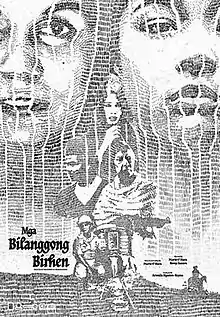The Captive Virgins
The Captive Virgins (Filipino: Mga Bilanggong Birhen) is a controversial 1977 Philippine period drama film produced by Armida Siguion-Reyna and directed by Mario O'Hara and Romy Suzara. The movie served as a commentary on the state of the Philippines in the 1920s during the American colonial period. Set in a Visayan town in 1923, the movie shows the resurgence of the “pulajanes” or the revolutionary movement after feelings of frustration of the American regime started to grow: the upper class still ruled society, poverty was still widespread, and injustice in the agrarian system remained prevalent.[1]
| Mga Bilanggong Birhen | |
|---|---|
 The poster of the film's restored version, released in 2019 | |
| Directed by |
|
| Produced by | Armida Siguion-Reyna |
| Written by | Mario O'Hara |
| Starring |
|
| Music by | Ryan Cayabyab |
| Cinematography | Romeo "Romy" Vitug |
| Edited by | Ike Jarlego |
Production company | Pera Films |
| Distributed by | ABS-CBN Film Productions (restored version) |
Release date |
|
Running time | 125 minutes |
| Country | Philippines |
| Language | |
The film was restored in 4K high-definition by the ABS-CBN Film Archives through the facilities of Central Digital Lab in Makati City as part of the Centennial Year of the Philippine Cinema. For overseas releases, the film's title is renamed as Familia Sagrada.
Cast
- Alma Moreno as Celina
- Trixia Gomez as Milagros
- Armida Siguion-Reyna as Felipa
- Rez Cortez as David
- Leroy Salvador as Señor Juan
- Mario Montenegro as Captain Pablo
- Monang Carvajal
- Ronnie Lazaro as Hermes
- Rodel Naval
Production
The film was shot in Bacolor, Pampanga.
Release
The film was premiered on December 24, 1977 as part of the 1977 Metro Manila Film Festival.
Digital restoration
The film was restored by the ABS-CBN Film Restoration and Central Digital Lab in Makati City, Metro Manila. Reyna Films, the production company owned and operated by Armida's son Carlos Siguion-Reyna and his wife Bibeth Orteza, supplied the 35mm master negative and sound negative of the 1977 film Mga Bilanggong Birhen. The negative was scanned in 4K and digitally restored in 2K resolution. The film took 550 hours of restoration to remove damage from the negative such as mold, film grain, splice marks, instability, flicker and to reconstitute several missing frames.[2]
The restored version of the film was premiered at Cinema '76 Film Society in San Juan City, Metro Manila. The film was attended by the film's co-director Romy Suzara, lead actress Alma Moreno, and cinematographer Romy Vitug. Actress Jobelle Salvador, the daughter of Leroy Salvador; producer Bibeth Orteza, daughter-in-law of Armida Siguion-Reyna; and Tess Carvajal, the granddaughter of Monang Carvajal, also attended the film's premiere through representation of the cast and crew who were deceased or unable to attend.[3][4]
Controversy
The film was left unfinished when Mario O'Hara left the production before the shooting ended. Eventually, Romy Suzara finished the remaining parts of the film.[5]
According to the memoir "Armida" by Monique Villonco, the film was a controversial piece of work because of certain love scenes, as well as the nude scene of one of the lead actresses, and six naked men pushing a bagon. Mario O’Hara had asked me, “Ma-ilulusot mo ba ito sa BRMPT (Board of Review for Motion Pictures and Television)?” and I told him that for the festival, there will be no problem, as it was agreed upon that selected entries will not go through censorship. I knew this because I was the president of the IMPDAP that year and Fernando Poe Jr. was president of the PMPPA. Both producers’ associations fought for it and Teodoro Valencia, head of the Executive Committee of the MMFF, had agreed. However, after the 10-day festival, the continued exhibition of the movie would be under the jurisdiction of the BRMPT. But I felt confident because the story was not about prurient interest. Lino loved the story and encouraged us to get Romeo Vitug as cinematographer and Laida Lim Perez as production designer.[6]
References
- "Digitally restored 'Mga Bilanggong Birhen to screen at Cinema 76 Classics". Manila Standard. 8 October 2019. Retrieved 11 December 2019.
- "MGA BILANGGONG BIRHEN (1977) Cinema '76 Premiere". Facebook. 26 September 2019. Retrieved 11 December 2019.
- "MGA BILANGGONG BIRHEN Premiere Interviews". Facebook. 9 October 2019. Retrieved 11 December 2019.
- "Alma Moreno recalls working with the late Armida Siguion-Reyna for Mga Bilanggong Birhen". Philippine Entertainment Portal. 30 September 2019. Retrieved 11 December 2019.
- "The height of Alma fandom, Brocka versus Armida, and the making of 'Mga Bilanggong Birhen'". ABS-CBN News Channel. 28 September 2019. Retrieved 11 December 2019.